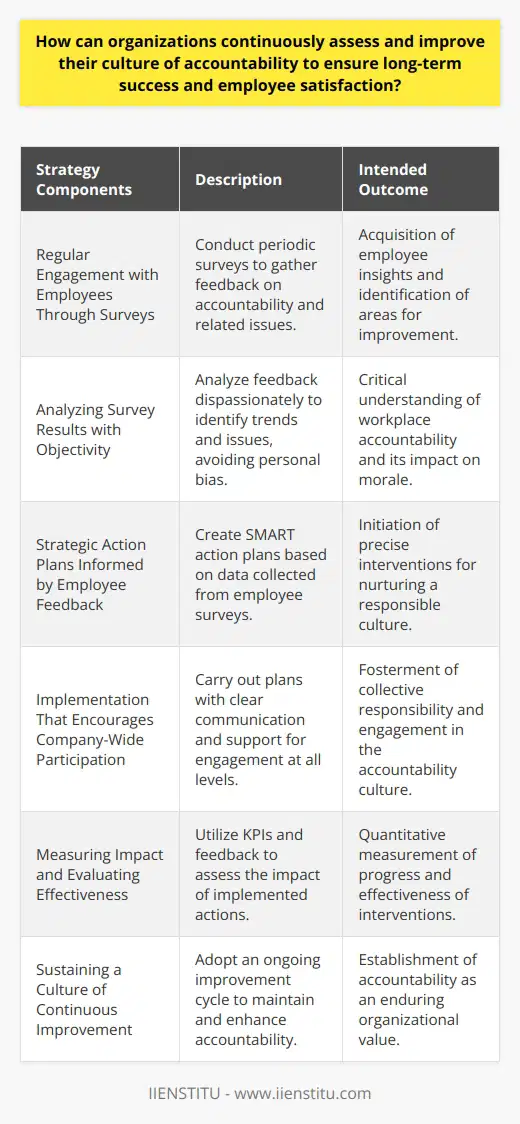
This article discusses the importance of an accountability culture in an organization and how human resources managers can help create and maintain it. An accountability culture is one in which employees take responsibility for their actions, behavior, performance, and results. It encourages employees to be honest, reliable, and dependable and to take ownership of their work. Human resources managers can help create an accountability culture by setting expectations, providing feedback and guidance, and creating an environment of trust. Examples of organizations with an accountability culture are Google and Amazon.
What is an Accountability Culture?
What are the Benefits of an Accountability Culture?
How Can Human Resources Managers Help Create an Accountability Culture?
Examples of Accountability Culture in Action
Conclusion
Introduction: Does your organization have an accountability culture? An organization’s culture is the prevailing behavior seen among its employees. It can be cooperative and collaborative or competitive and guarded. An organization with an accountability culture holds employees responsible for their actions, behavior, performance, and results. This culture is essential for any organization to succeed, and human resources managers play a crucial role in creating and maintaining it.
What is an Accountability Culture?
An accountability culture is one in which employees take responsibility for their actions, behavior, performance, and results. It is a culture of trust where employees are expected to be honest, reliable, and dependable. It is a culture in which employees are held accountable for their actions, and mistakes are seen as opportunities for learning and growth.
What are the Benefits of an Accountability Culture?
An accountability culture benefits any organization because it increases employee engagement and performance. Employees held accountable for their actions are likelier to put forth their best effort and take ownership of their work. An accountability culture also encourages collaboration and communication, which leads to better decision-making and problem-solving.
How Can Human Resources Managers Help Create an Accountability Culture?
Human resources managers play a critical role in creating an accountability culture. They can help set expectations for employees and ensure they are met. They can also provide feedback and guidance to employees to help them improve their performance. Additionally, human resources managers can create an environment of trust by providing support and recognition for employees who demonstrate accountability.
Examples of Accountability Culture in Action
One example of an organization with an accountability culture is Google. At Google, employees are expected to take ownership of their work and be held accountable for their actions. Google also encourages collaboration and communication among its employees and provides feedback and recognition for employees who demonstrate accountability.
Another example is Amazon. Amazon has a “frugal innovation” culture, which encourages employees to take risks and be creative. In addition, employees are expected to take ownership of their work and be accountable for their results.
Conclusion: An accountability culture is essential for any organization to succeed. It encourages employees to take ownership of their work, be honest, reliable, and dependable, and be held accountable for their actions. Human resources managers are critical in creating and maintaining an accountability culture. They can set expectations for employees, provide feedback and guidance, and create an environment of trust. Examples of organizations with an accountability culture include Google and Amazon.
Accountability breeds trust and trust breeds success in Human Resources Management.
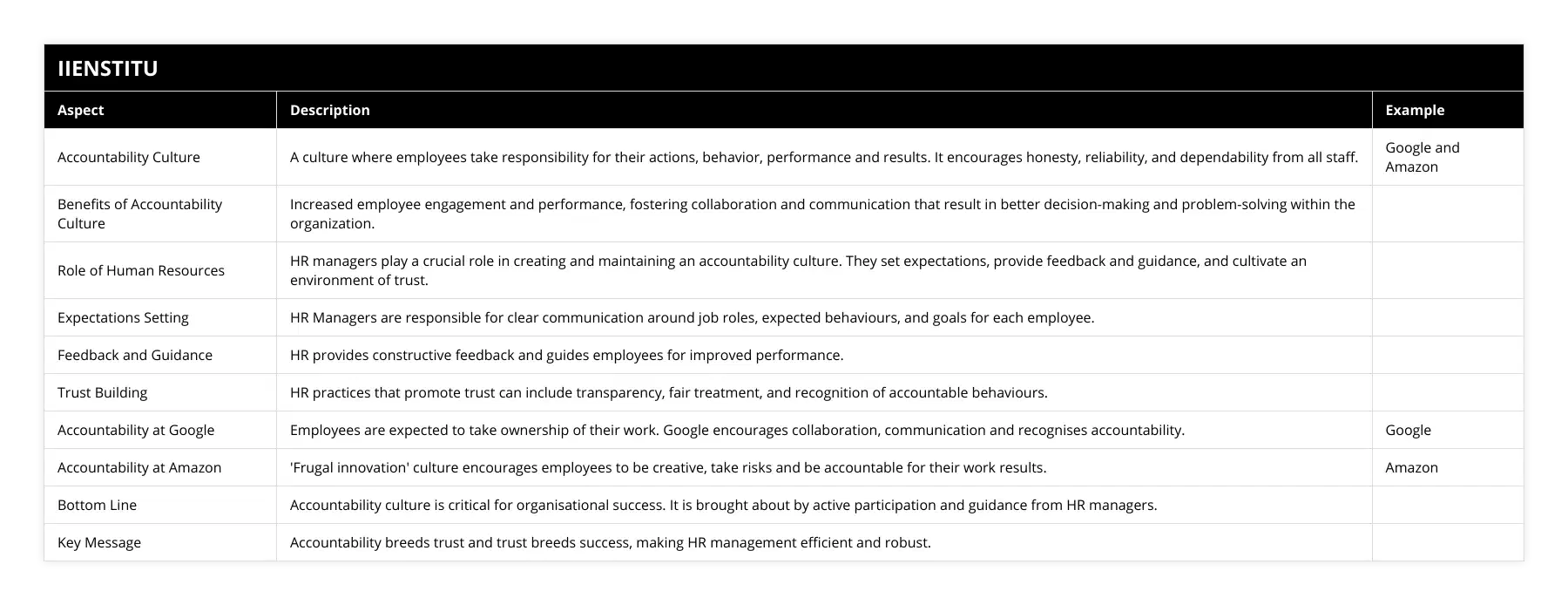
Frequently Asked Questions
What are the key components of an accountability culture in Human Resources Management?
Human Resources Management (HRM) is a critical component of an organization’s success, as it is responsible for managing and developing the organization’s most valuable asset – its people. Organizations must create and nurture an environment of accountability to ensure that all employees are held accountable for their actions. An accountability culture in HRM is essential to ensure that employees are held responsible for their performance and that they are held to the highest standards of conduct.
The critical components of an accountability culture in HRM include clear and consistent communication, a comprehensive performance management system, and a commitment to accountability at all levels of the organization. Clear and consistent communication is essential because it sets expectations and provides employees with the information they need to understand what is expected. A comprehensive performance management system is also necessary, as it allows for a framework for measuring and rewarding employee performance. Lastly, a commitment to accountability at all levels of the organization is required to ensure that everyone is held to the same standards.
To create an accountability culture in HRM, organizations must also ensure that employees understand the consequences of their actions. This means that employees must be informed about the potential effects of not meeting expectations and understand the importance of being held to the same standards as their colleagues. Furthermore, organizations must ensure that employees are held accountable for their actions by providing feedback and guidance and taking appropriate action when necessary.
Finally, organizations must create an environment where employees feel safe to speak up and take ownership of their actions. When employees feel comfortable expressing their opinion and taking ownership of their work, they are more likely to be held accountable for their actions. This creates an environment of mutual trust and respect and an atmosphere of accountability.
In conclusion, an accountability culture in HRM is essential to ensure that employees are held responsible for their performance and that they are held to the highest standards of conduct. The critical components of an accountability culture in HRM include clear and consistent communication, a comprehensive performance management system, and a commitment to accountability at all levels of the organization. Additionally, organizations must ensure that employees understand the consequences of their actions and feel safe to speak up and take ownership of their work.
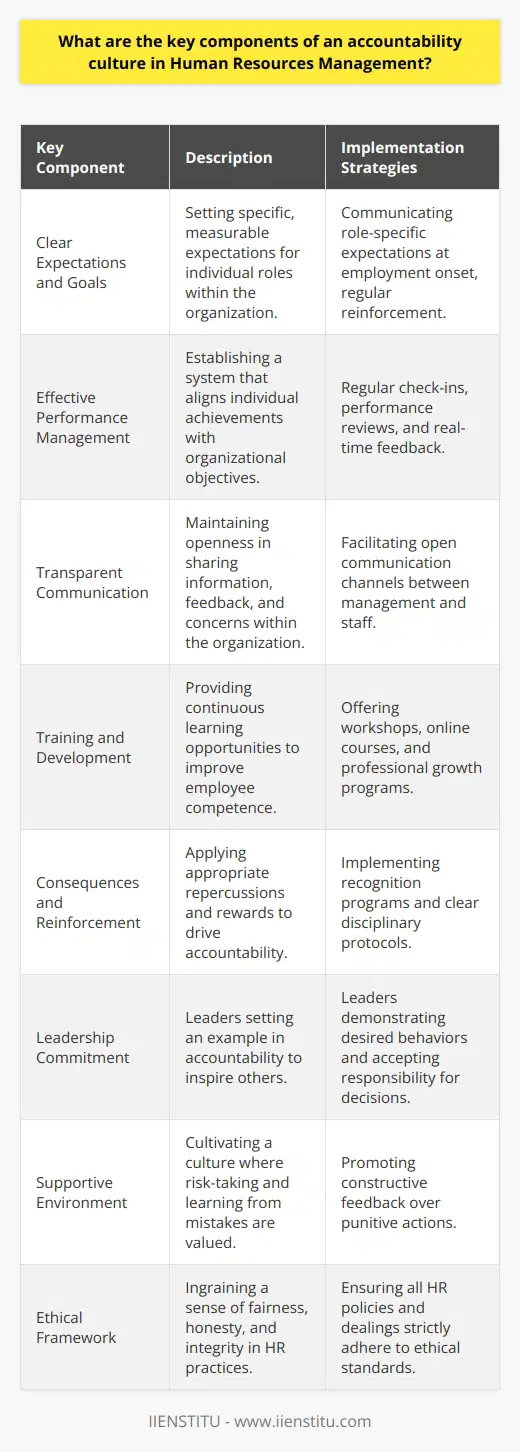
How can Human Resources Managers help create an effective accountability culture?
Organizational success is mainly dependent on the effectiveness of the Human Resources (HR) Manager. The role of the HR Manager is to ensure that the organization has the best possible personnel and that the personnel is managed in a way that promotes organizational efficiency. As such, the HR Manager has a critical role to play in helping to create an influential accountability culture.
An influential accountability culture is one in which employees take responsibility for their actions and are held accountable for their performance. Such a culture encourages employees to take the initiative, strive for excellence, and to be self-motivated. It also helps ensure that the organization's goals and objectives are achieved.
There are several steps that HR Managers can take to create an influential accountability culture. The first is ensuring employees understand the organization's goals and objectives. This can be done through formal training and communication sessions. Additionally, HR Managers should ensure that employees are provided with the necessary resources to achieve these goals. This may include providing employees with access to the latest technology, training on the latest tools and software, and access to the latest industry best practices.
HR Managers should also ensure that employees are held accountable for their performance. This can be done by instituting a system of performance reviews and feedback. This will allow employees to know where they stand in their performance and be held accountable for any deficiencies. Additionally, HR Managers should ensure that rewards are in place for employees performing well. This could include bonuses, promotions, or other incentives.
Finally, HR Managers should ensure that employees have the necessary support to help them succeed. This includes providing employees with the required resources, such as access to mentors and coaches, and the essential tools and resources to help them succeed.
By taking these steps, HR Managers can help create an influential accountability culture within their organization. This, in turn, will help the organization achieve its goals and objectives.
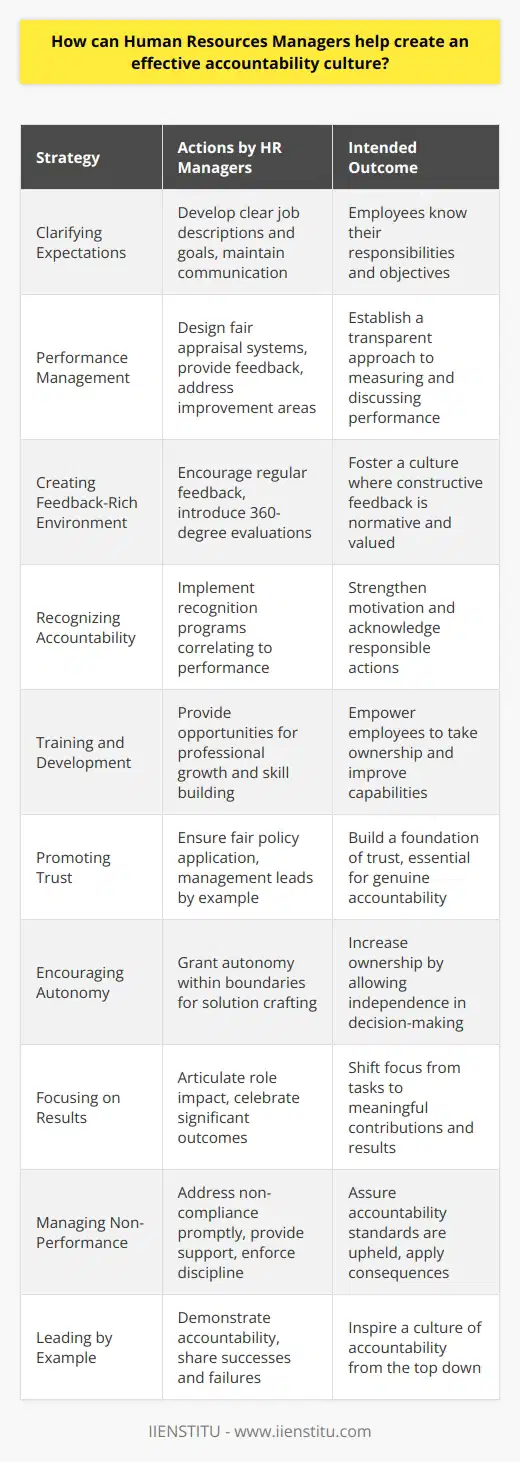
What are some examples of successful accountability cultures in action?
Accountability cultures, or cultures of accountability, can be defined as organizational cultures that ensure all members are held to the same standards and expectations. Such cultures are becoming increasingly important in today’s organizations, as they can help to create an environment of trust and cooperation and help to ensure that goals and objectives are met. This article will discuss some examples of successful accountability cultures in action.
One example of a thriving accountability culture in action is that of the U.S. Navy. This organization has a highly structured chain of command and a system of checks and balances designed to ensure that all personnel is held to the same high standards. This kind of accountability culture is evident in the Navy’s emphasis on training and the accountability expected from all members, regardless of rank or position.
Another example of a thriving accountability culture in action is that of the United Nations. The United Nations is an international organization made up of member states worldwide. The United Nations has developed a culture of accountability that ensures all member states are held to the same standards and expectations. This includes holding member states accountable for their actions, such as in the case of the UN Security Council’s sanctions against particular countries.
Finally, Google is another example of a thriving accountability culture in action. Google has a culture of transparency and accountability that ensures all employees are held to the same standards of conduct and performance. This culture is evident in the company’s emphasis on transparency and that all employees are expected to take responsibility for their actions.
These examples demonstrate the importance of accountability cultures in today’s organizations. By creating a culture of accountability, organizations can ensure that all members are held to the same standards and expectations and that goals and objectives are met. As such, organizations should strive to create an influential accountability culture to ensure that their goals are met and that their members are held to the highest standards of conduct.
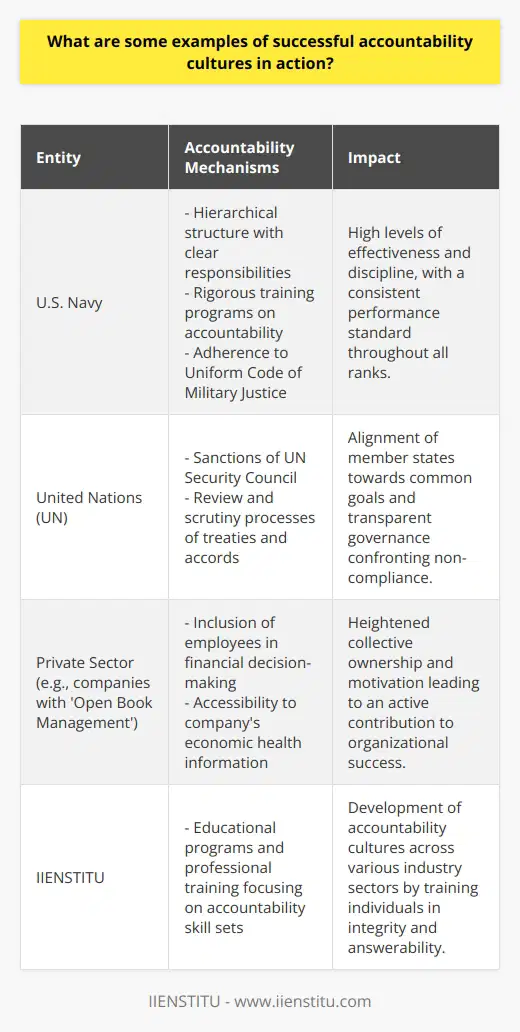
How do you create a culture of accountability within an organization?
Defining Organizational Accountability
A culture of accountability within an organization refers to an environment where employees take responsibility for their actions, understand the impact of their decisions, and exhibit proactive behaviors in taking ownership for their work. Creating a culture of accountability requires a combination of clear communication, well-defined expectations, and consistent consequences.
Setting Clear Expectations
The foundation of accountability lies in setting explicit expectations for employees. This includes clearly outlining job roles, responsibilities, and performance expectations for each team member. Management should also actively involve employees in creating their own goals and objectives, ensuring they align with the organization's overall vision and mission.
Establishing Open Communication Channels
A transparent and open communication system is paramount in fostering accountability. Managers should create an environment that encourages open discussions, solicits feedback, and addresses issues promptly. By doing so, employees feel empowered to express their concerns, collaborate on solutions, and take responsibility for their performances.
Encouraging Employee Ownership
To cultivate a culture of accountability, organizations should promote an atmosphere where employees take ownership of their work. This can be achieved by providing training and development opportunities, empowering employees to make decisions, and acknowledging their contributions. By recognizing employee achievements and offering growth opportunities, organizations reinforce the importance of individual responsibility and dedication to the overall success of the organization.
Implementing Performance Metrics
An effective accountability system relies on measurable indicators of success. Clearly defined performance metrics assist organizations in monitoring progress, identifying areas for improvement, and evaluating overall performance. These benchmarks encourage employees to understand their contributions to the organization's objectives and analyze their own accomplishments against predetermined goals.
Enforcing Consequences for Performance
Consistent consequences for both exemplary and inadequate performance are essential in maintaining a culture of accountability. While celebrating accomplishments and rewarding high performers, organizations should also address underperformance in a timely and fair manner. This ensures that employees understand the impact of their actions and fosters a sense of responsibility and improvement.
In conclusion, cultivating a culture of accountability within an organization hinges on the establishment of clear expectations, open communication, employee ownership, performance metrics, and consistent consequences. Implementing these components not only fosters a sense of responsibility among employees but also contributes to the overall success and growth of the organization.
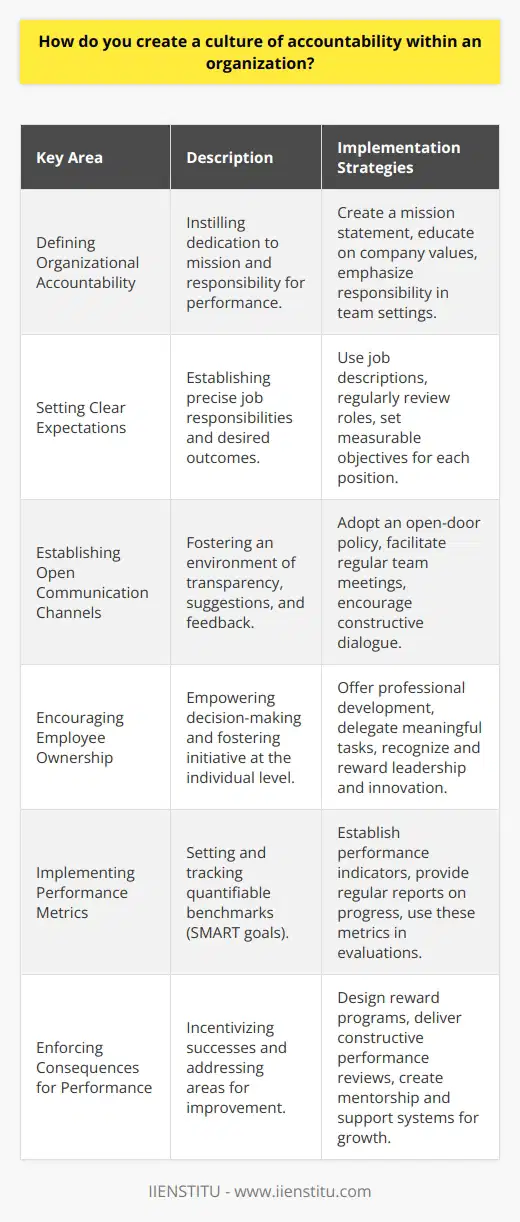
What are the 4 key areas of accountability to consider when fostering a culture of responsibility?
Establishing Accountability and Responsibility
In order to foster a culture of responsibility, it is crucial to consider four key areas of accountability. These encompass setting clear expectations, providing necessary resources, tracking progress, and recognizing achievements.
Setting Clear Expectations
Firstly, clearly defining the roles and responsibilities of each individual within the organization is essential. By setting specific goals and communicating them effectively, team members will be well-equipped to meet expectations and understand their contributions to the organization as a whole.
Providing Necessary Resources
Secondly, ensuring that employees have access to the resources, tools, and training necessary for success supports a culture of responsibility. By empowering individuals to excel in their roles, they become more accountable for their actions and invested in the organization's goals.
Tracking Progress
Thirdly, implementing systems to regularly monitor and evaluate performance is a crucial aspect of fostering accountability. By consistently measuring progress and providing feedback, employees are encouraged to continuously improve and uphold a higher standard of responsibility.
Recognizing Achievements
Lastly, acknowledging and celebrating the achievements of individuals within the organization reinforces a culture of responsibility. By recognizing and rewarding hard work and dedication, team members become motivated to maintain their high level of performance and commitment to the organization's success.
In conclusion, fostering a culture of responsibility involves addressing multiple areas of accountability. By setting clear expectations, providing necessary resources, tracking progress, and recognizing achievements, organizations can create an environment where individuals feel supported, engaged, and motivated to contribute effectively to the mission and vision of the organization.
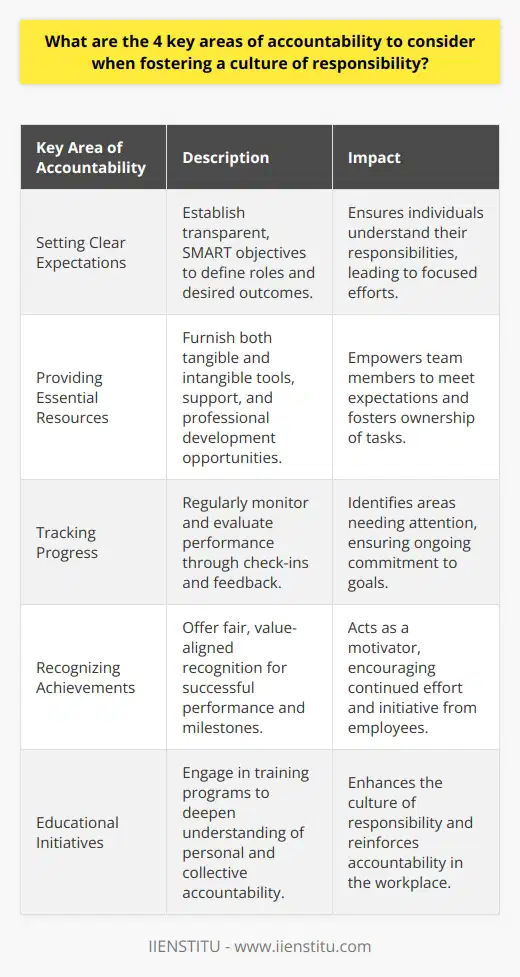
What does it mean to create a culture of accountability and how can it impact employee performance and overall business success?
Creating a Culture of Accountability
Defining Accountability
A culture of accountability refers to an organizational environment where individuals consistently take responsibility for their actions and the associated outcomes. This environment values and rewards transparency, honesty, and ownership, thus fostering improved employee performance and business success.
Impact on Employee Performance
Cultivating a culture of accountability directly influences employee performance by setting clear expectations, encouraging open communication, and providing timely feedback. Employees feel empowered to make decisions, take calculated risks, and learn from their mistakes, leading to increased motivation and higher levels of engagement.
Role of Leaders
Leaders must model accountable behavior to set an example for their teams. They should hold themselves accountable for their actions, recognize their team's contributions, and accept responsibility for mistakes. By openly discussing team goals and individual expectations, leaders can create trust and foster accountability within their teams.
Continuous Improvement
An accountable organization continuously focuses on improving its processes and performance. This growth mindset encourages employees to constantly assess their actions and seek opportunities to learn and develop. Continual improvement promotes efficiency and innovation, positioning the organization for long-term success.
Impact on Business Success
Companies that embrace accountability experience multiple benefits, including increased productivity, enhanced employee morale, and improved client satisfaction. As employees take ownership of their performance, businesses benefit from streamlined operations and a more agile response to changing market conditions. Accountability directly correlates with an organization's ability to retain top talent and attain a competitive edge in the market.
In conclusion, fostering a culture of accountability is paramount for organizations aiming to enhance employee performance and achieve lasting business success. By establishing clear expectations, promoting open communication, and supporting continuous improvement initiatives, a culture of accountability drives employee engagement and innovation, leading to a prosperous and sustainable future.
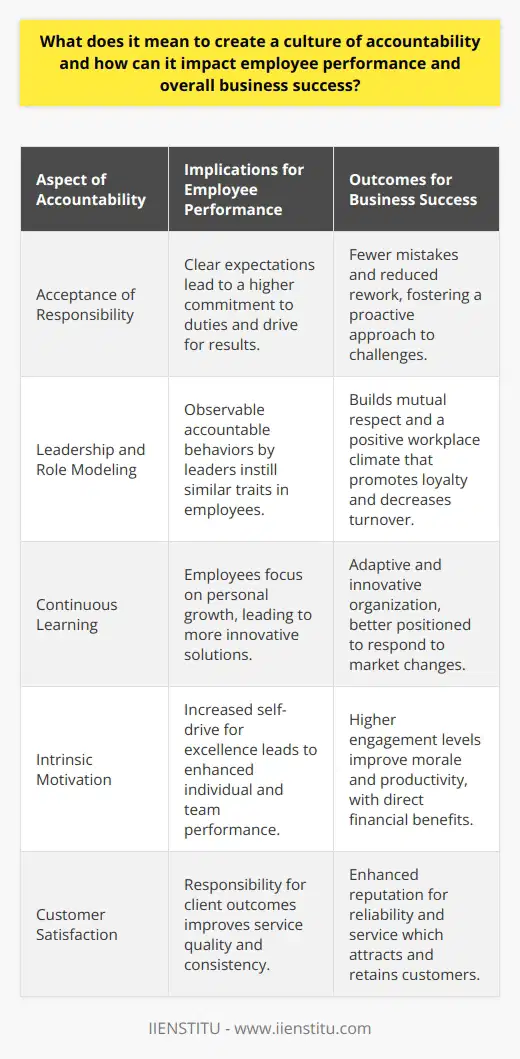
How do you create a culture of accountability within a diverse workforce?
Establishing Clear Expectations
Creating a culture of accountability within a diverse workforce requires establishing clear expectations and setting individual and team goals. Employers must communicate these expectations and goals to their employees, leaving no room for ambiguity. Encouraging open dialogue and ensuring understanding among all parties is crucial to this process.
Developing Inclusive Leadership
Promoting inclusive leadership is crucial to drive accountability across a diverse workforce. Leaders should demonstrate an understanding of diversity and inclusivity as they hold their teams accountable for achieving goals. Furthermore, leadership training should encompass strategies to accommodate and sustain cultural differences, fostering an environment where each employee feels valued and respected.
Supporting Employee Growth
To accelerate accountability within a diverse workforce, employers should create opportunities for employees' growth and development. Providing access to resources, training programs, and mentoring can help drive employee engagement and instill personal accountability. In turn, this investment in employees empowers them to assume responsibility for their performance and professional growth.
Recognizing and Addressing Unconscious Bias
Addressing unconscious bias is essential in building an accountable culture. Employers and leaders must acknowledge where biases may exist within the organization and implement strategies to mitigating their impact. This includes conducting regular bias-awareness training for leaders and employees, encouraging them to recognize and overcome such biases when engaging with colleagues.
Evaluating and Measuring Performance
Regularly evaluating and measuring employee performance is key to maintaining a culture of accountability. Employers should set performance metrics that align with both individual capabilities and organizational goals. Additionally, incorporating diversity and inclusion outcomes in performance reviews can enable the workforce to become more accountable and proactive in promoting an inclusive environment.
Celebrating Success and Learning from Failure
Lastly, organizations should celebrate success and learn from failure in a transparent manner. Recognizing and rewarding employees who exhibit accountability, regardless of their cultural background, reiterates the importance of an accountable work culture. Similarly, examining instances where accountability has lapsed and applying learned lessons can enhance employees' understanding of their role in sustaining the accountable culture.
In conclusion, creating a culture of accountability within a diverse workforce requires concerted efforts such as setting clear expectations, promoting inclusive leadership, supporting employee growth, addressing unconscious bias, and ensuring fair evaluation of employee performance. By adopting these strategies, organizations can foster an environment that values diversity, inclusivity, and accountability, leading to improved performance and long-term success.
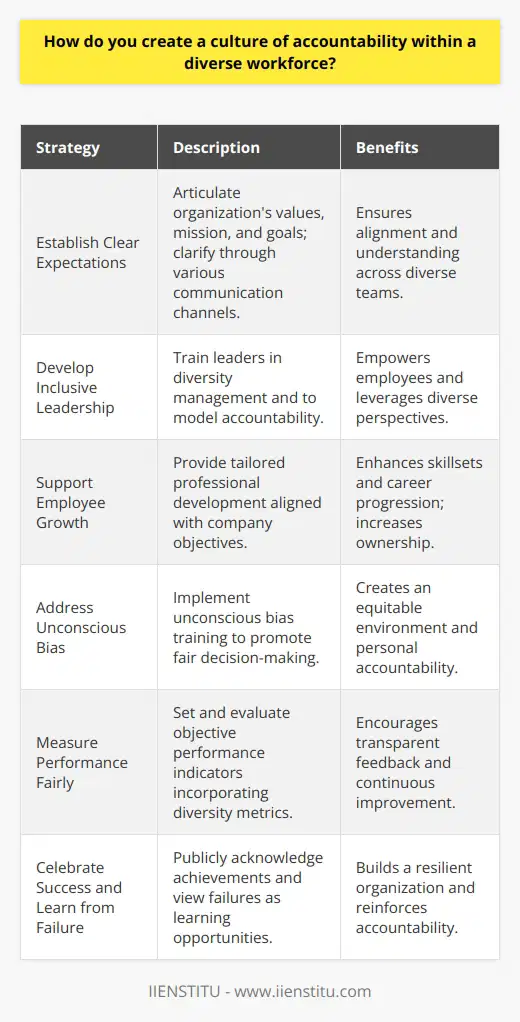
What are the best strategies to engage employees in the development and sustainability of an accountability culture?
Establishing Clear Expectations
The first crucial strategy to engage employees in the development of an accountability culture is by establishing clear expectations. Employers should communicate their goals and objectives, ensuring all team members understand the tasks and timelines assigned to them.
Encouraging Open Communication
Open communication reinforces accountability, fostering a transparent working environment. Regular meetings and discussions promote knowledge sharing and enable employees to voice concerns, seek assistance, and offer valuable insights on various projects, further supporting sustainable accountability practices.
Empowering Employees
Empowering employees involves trusting them to make informed decisions, establish priorities, and manage time efficiently. As workers feel more responsible for their tasks, engagement in the accountability culture will increase. This will lead to greater motivation and a commitment to achieving higher standards.
Monitoring Performance and Offering Feedback
Tracking employees' performance and providing constructive feedback is essential in the development of an accountability culture. Regular assessments and evaluations are critical tools in identifying weaknesses, setting benchmarks, and adjusting expectations. Well-timed feedback also serves as motivation for continuous improvement, reiterating the value of responsibility and dedication to the organization's goals.
Recognizing and Rewarding Achievements
Appreciating employee accomplishments instills a sense of pride and reinforces accountability. By offering rewards, organizations can express gratitude, motivate employees to strive for excellence, and cultivate a strong work ethic. This positive reinforcement of employees' contributions propels the growth of an accountability culture.
Creating a Supportive Environment
Nurturing a supportive environment involves encouraging collaboration, providing resources, and addressing concerns. Employers can foster teamwork through mentorship programs, knowledge-sharing initiatives, and promoting group problem-solving. This in turn instills confidence and contributes to employees feeling more accountable for their actions.
In conclusion, establishing clear expectations, encouraging open communication, empowering employees, monitoring performance, offering feedback, recognizing achievements, and creating a supportive environment are effective strategies to engage employees in the development and sustainability of an accountability culture. By implementing these approaches, organizations can foster a sense of collective responsibility, ensuring continued success and growth.
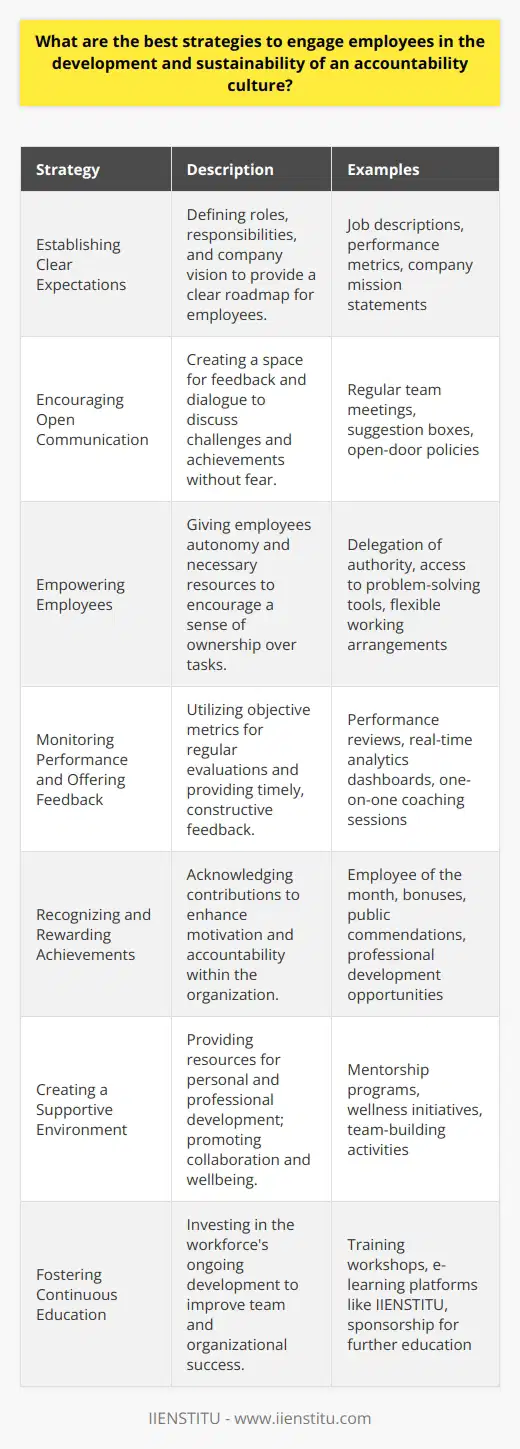
How can managers effectively support and maintain high levels of accountability across all organizational levels?
Establishing Clear Role Expectations
To ensure high levels of accountability at all organizational levels, managers must first establish clear role expectations for employees. This involves defining specific tasks, responsibilities, and performance metrics for each role within the organization. By making these expectations transparent, employees are better equipped to understand their individual contribution towards achieving the organization's overall objectives.
Creating a Culture of Feedback and Open Communication
Encouraging open communication and a feedback-driven culture within the organization can further enhance accountability. Managers should actively solicit input from their team members, fostering a collaborative environment where employees feel comfortable providing suggestions for improvement or raising concerns. This practice also allows managers to promptly address any deviations from expected performance and provide constructive feedback when necessary, thus instilling a sense of ownership and responsibility among employees.
Implementing Regular Performance Assessments
Establishing a system for regular performance assessments is vital for maintaining accountability across all organizational levels. Implementing such a system allows managers to not only track individual employee progress but also detect patterns and trends that may require attention. By consistently assessing employee performance and providing timely feedback, managers can ensure that employees remain focused on achieving their targets while also maintaining high levels of engagement and motivation.
Rewarding and Recognizing Achievements
Recognizing and rewarding employee achievements can be an effective approach for fostering accountability within the organization. By celebrating successes and highlighting the contributions of high-performing individuals, managers can encourage a sense of pride and personal investment in the organization's success. This also helps establish a positive work environment where employees feel motivated to continually strive for excellence and take ownership of their work.
Addressing Underperformance Proactively
Lastly, managers should proactively address instances of underperformance, adopting a solutions-oriented mindset to assist employees in overcoming challenges. This approach involves identifying potential barriers to success, providing additional resources or support as needed, and working collaboratively with the employee to develop a clear plan for improvement. By demonstrating both empathy and commitment to their employees' success, managers can effectively support a culture of accountability and continuous improvement across all levels of the organization.
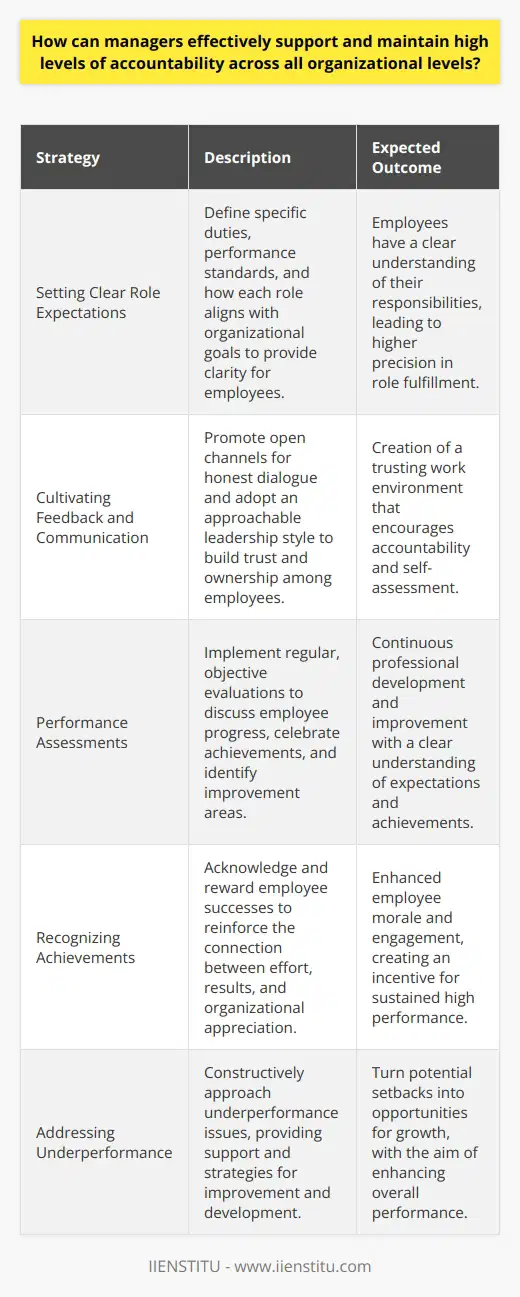
What are the 3 elements of accountability in management crucial for maintaining transparency and fostering trust?
Elements of Accountability in Management
Introduction
Accountability is a vital component in management practices, as it fosters transparency and trust. Three essential elements of managerial accountability are goals and expectations, performance measurement, and feedback and communication.
Goals and Expectations
The first element of accountability involves setting clear and measurable goals and expectations for employees. Establishing clear objectives aids in ensuring that employees understand their roles and responsibilities and that their performance aligns with the organization's expectations. It also contributes to transparent work processes through clearly defining employees' duties and tasks, which can be evaluated and assessed regularly. A strong emphasis on goal-setting promotes accountability by motivating employees to meet the defined standards, leading to effective performance management.
Performance Measurement
The second aspect of accountability is performance measurement, which requires organizations to evaluate employees' output based on predetermined metrics and key performance indicators (KPIs). Regular monitoring of employee performance helps managers to maintain transparency by providing an objective evaluation of each individual's contributions. Performance measurement also enables employees to understand their areas of improvement and strengths, fostering a culture of continuous learning and growth. Additionally, an objective measurement of performance outcomes can facilitate trust in the organization's fairness, promoting a sense of accountability among team members.
Feedback and Communication
The final element of accountability in management is feedback and communication, which entails an open and transparent exchange of information between managers and employees. Constructive feedback, shared regularly with team members, can help employees understand their performance relative to the set expectations, fostering a sense of responsibility for their work outcomes. Effective communication, both within the management team and with employees, also promotes trust by ensuring that employees are informed and involved in decision-making processes. Encouraging a continuous dialogue between managers and employees enables the organization to maintain accountability, accurate performance assessments, and an inclusive work environment.
Conclusion
In conclusion, fostering accountability in management is essential for maintaining transparency and trust in an organization. By effectively setting goals and expectations, applying robust performance measurement techniques, and promoting open communication, organizations can create an environment where employees feel responsible for their performance and aligned with the organization's objectives.
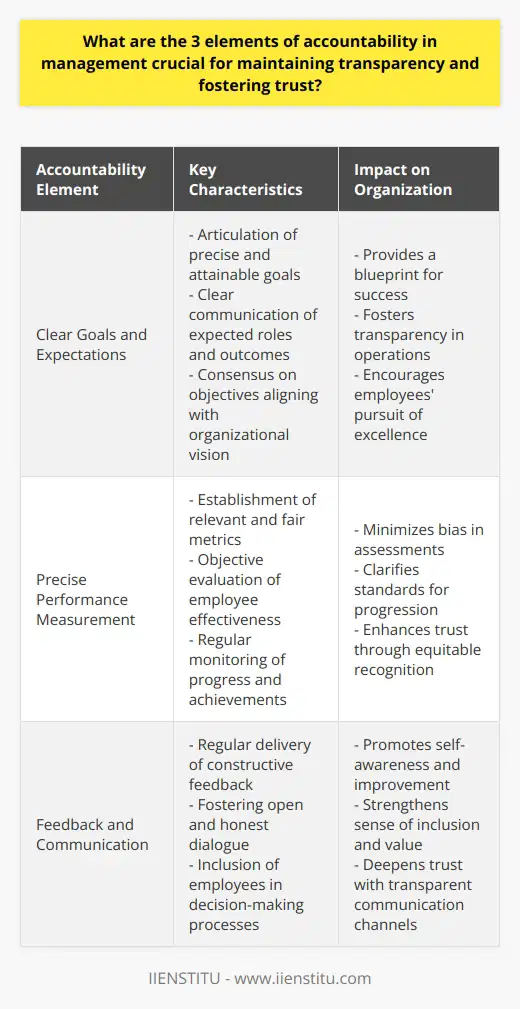
How do the 3 C's of accountability contribute to a more efficient, responsible, and positive organizational environment?
**Understanding the 3 C's of Accountability**
The 3 C's of accountability, which comprise communication, commitment, and consequences, play a crucial role in fostering a more efficient, responsible, and positive organizational environment. These components work in tandem to facilitate good management practices, employee engagement, and shared responsibility in the workplace.
**Effective Communication**
The first component, communication, is essential in ensuring that all team members are well informed, understand their roles and responsibilities, and aligned with the organization's objectives. Open and clear communication channels contribute to efficient decision-making, greater trust within the team, and fewer chances of miscommunication and misunderstandings. Hence, communication serves as a foundation for a positive and productive work environment.
**Strong Commitment**
Commitment, the second component, involves the dedication of employees and management to uphold their responsibilities and pursue the organization's goals. A strong commitment from the workforce reflects a sense of ownership and pride in their work, resulting in increased productivity and a higher quality of output. This shared sense of purpose fosters employee motivation and boosts morale, leading to a more positive organizational environment.
**Enforcing Consequences**
Lastly, the implementation of consequences ensures that team members hold themselves and each other accountable for their actions and performance, thereby fostering the responsible behavior necessary for a successful organization. Consequences can take the form of rewards or sanctions, where positive reinforcement can motivate employees to perform at their best, while sanctions act as a deterrent for poor performance or irresponsible behavior. This approach not only encourages a culture of accountability but also empowers team members to learn and grow from their experiences.
**Conclusion**
In summary, the 3 C's of accountability - communication, commitment, and consequences - seamlessly interconnect to create a more efficient, responsible, and positive organizational environment. By embracing these principles, organizations can enhance their management practices, boost employee engagement, and promote a culture of shared responsibility. As a result, the organization can become more competitive, sustainable, and primed for success.
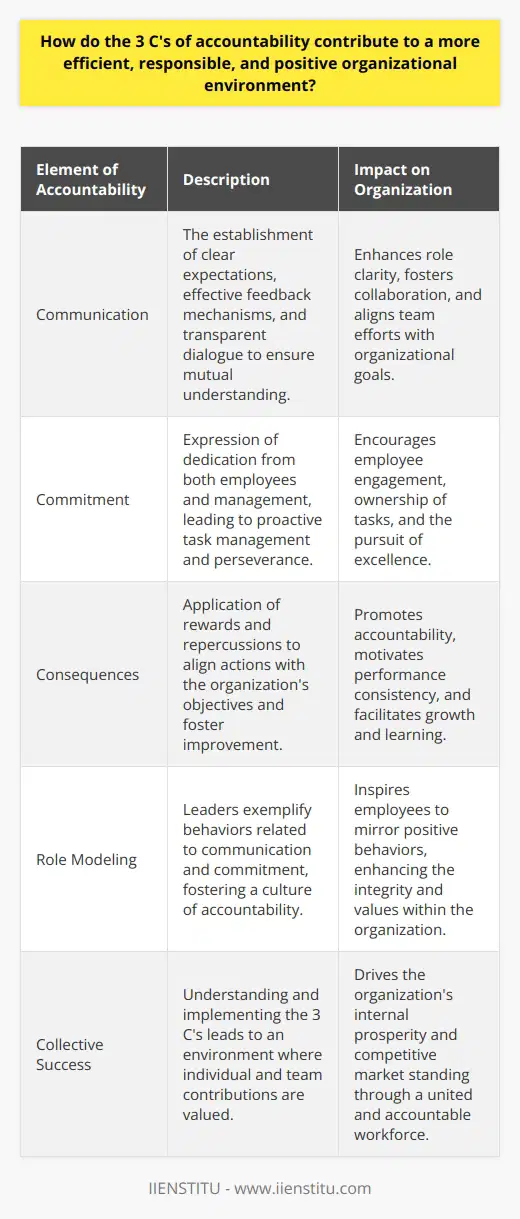
What role do the 4 key areas of accountability play in promoting ethical behavior and decision-making among employees?
Role of the 4 Key Areas of Accountability
Effective corporate governance requires a strong framework of internal controls and ethical practices. Among these, accountability plays a vital role in fostering ethical behavior and decision-making among employees. Four key areas of accountability can be identified for promoting ethical actions: individual, organizational, societal, and environmental.
Individual Accountability and Ethical Behavior
Individual accountability refers to the responsibility of each employee for their actions. It is essential in maintaining high standards of ethical behavior in an organization. When employees recognize that they are accountable for their decisions and actions, they are more likely to act ethically and take responsibility for their choices. This fosters a culture of integrity, honesty, and transparency within the organization.
Organizational Accountability and Decision-Making
Organizational accountability requires companies to establish clear policies, procedures, and standards of ethical conduct. Implementing these measures ensures that all employees are aware of the company's expectations regarding ethical behavior and decision-making. Moreover, organizations must consistently enforce these policies to ensure that employees understand the consequences of unethical actions. This creates a corporate culture that promotes sound decision-making based on established principles and values.
Societal Accountability and Employee Ethics
Societal accountability involves an organization's relationship with its stakeholders, such as customers, vendors, and local communities. Companies that prioritize stakeholder engagement demonstrate a commitment to ethical behavior and responsible decision-making. Such organizations aim to address the needs and concerns of their stakeholders while balancing the interests of different parties. This fosters a positive relationship between the company and its stakeholders, encouraging ethical conduct among employees.
Environmental Accountability and Ethical Choices
Finally, environmental accountability concerns the impact of an organization's operations on the environment. Companies that prioritize sustainability and environmental stewardship demonstrate a commitment to ethical principles. By setting environmental objectives and monitoring their performance in this regard, organizations can encourage employees to make ethical choices and consider the consequences of their actions on the environment.
In conclusion, the four key areas of accountability - individual, organizational, societal, and environmental - play a critical role in promoting ethical behavior and decision-making among employees. By emphasizing these aspects of accountability, companies can create a culture of integrity and responsible action, fostering trust and positive relationships with stakeholders.
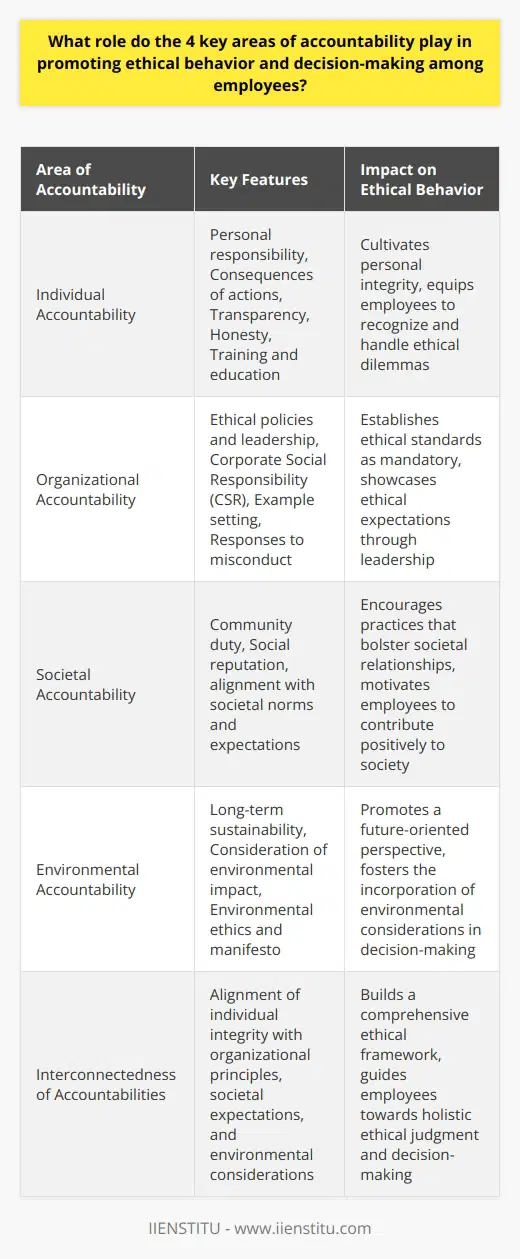
What are the essential aspects of developing an accountability culture in today's multidisciplinary workplace?
Building Trust and Transparency
One essential aspect of developing an accountability culture in today's multidisciplinary workplace is fostering trust and transparency. Trust is crucial in creating a work environment where employees feel watched and supported in their actions. Transparency, on the other hand, ensures clear communication of expectations, responsibilities, and outcomes to all team members.
Empowering Employees with Autonomy
Another important factor in cultivating an accountability culture is empowering employees with the autonomy to take charge of their roles. Granting them the freedom to make decisions and solve problems enhances their sense of responsibility and commitment to their tasks. Moreover, it enables them to learn from their mistakes, thereby strengthening their professional growth.
Setting Clear Goals and Expectations
To develop a culture of accountability in a multidisciplinary workplace, it is essential to set clear goals and expectations for each team member. This entails establishing specific, measurable, achievable, relevant, and time-bound (SMART) objectives that align with the organization's overall goals. Having a well-defined roadmap enables employees to stay focused and strive for excellence in their respective roles.
Creating a Supportive Environment
A supportive work environment is crucial for fostering an accountability culture. This involves providing employees with the necessary resources, training, and mentorship to excel at their responsibilities. Additionally, management must be proactive in addressing concerns and providing constructive feedback that facilitates professional growth and development.
Recognizing and Rewarding Accountability
Recognizing and rewarding employees who demonstrate a high level of accountability can significantly reinforce this desired behavior. Offering incentives, such as bonuses, promotions, or public recognition, motivates individuals to maintain and enhance their commitment to upholding workplace expectations.
Implementing Regular Performance Reviews
Finally, regular performance reviews are essential to ensure all team members are held accountable for their actions and the achievement of set goals. These assessments enable managers to identify employees' strengths and areas for improvement, providing a platform for focused progress and development.
In conclusion, developing an accountability culture in today's multidisciplinary workplace requires building trust and transparency, empowering employees with autonomy, setting clear goals, creating a supportive environment, recognizing and rewarding commitment, and conducting regular performance evaluations. Emphasizing these elements fosters a strong sense of responsibility among employees, ultimately leading to improved productivity and organizational success.

How do the 4 key areas of accountability contribute to the overall success of an organization and its employees?
Organizational Success through Accountability
Setting Clear Expectations
One way that accountability contributes to organizational and employee success is by setting clear expectations for performance and behavior. By establishing and communicating specific goals, employees are empowered to take ownership of their work and understand how their actions contribute to the organization's success. This clarity helps employees stay focused and remain motivated to achieve their objectives, thus driving overall organizational growth and performance.
Fostering Transparency and Trust
Accountability also involves transparency and trust between employees and management. Open communication channels allow for open and honest dialogue, enabling individuals to seek feedback on their performance and address any concerns promptly. Transparent processes and decisions not only further employees' understanding of their role within the organization but also foster trust, thereby boosting morale and retaining top talents. Ultimately, high levels of trust and transparency promote an environment where employees feel valued, decreasing turnover rates, and improving performance.
Encouraging Responsibility and Ownership
Promoting accountability within an organization cultivates a sense of ownership among its employees. When individuals realize they are accountable for their actions and decisions, they are more committed to ensuring their work aligns with the organization's goals and values. This empowerment leads to increased job satisfaction, motivation, and ultimately, successful outcomes. Employees who take responsibility for their work not only contribute to the organization's success but also their own personal and professional growth.
Continuous Improvement and Adaptability
Finally, integrating accountability into an organization's culture encourages continuous improvement and adaptability. By evaluating performance and identifying areas of improvement, employees engage in ongoing learning and development, enhancing their skills and expertise. Constantly striving for improvement enables the organization to adapt to changes in the market or industry, benefiting from innovations and emerging opportunities. In this way, accountability serves as a catalyst for sustaining long-term success and growth for both the organization and its employees.
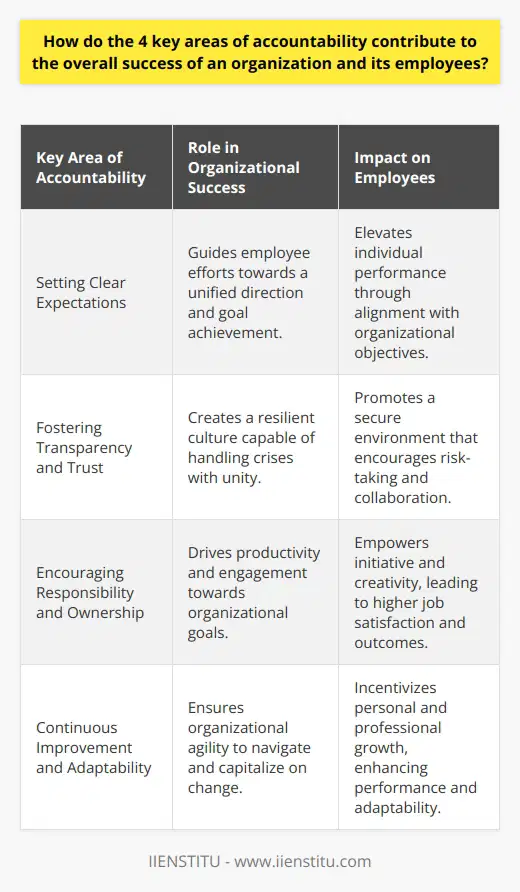
What are the 3 elements of accountability in management that serve as the foundation for a responsible and performance-driven work environment?
### Elements of Accountability in Management
The first essential element of accountability in management is setting clear goals and expectations. Managers must establish well-defined objectives for their employees, outlining each team member's responsibilities and the specific outcomes they are expected to achieve. These goals must be measurable, achievable, and time-bound, providing employees with a framework for success.
### Regular Performance Evaluation and Feedback
The second element is the consistent evaluation of employee performance through regular feedback and appraisal. Managers must hold employees accountable for their work by monitoring progress regularly, offering constructive criticism, and recognizing achievements. This feedback process enables employees to adjust their efforts, improve competence, and ensure they stay on track to meet their goals.
### Consequences for Performance Variability
The final element of accountability in management is providing consequences for varying levels of performance. These consequences can be both positive and negative, with rewards for those who exceed expectations and penalties for those who underperform. By implementing a system based on merit and fairness, managers can foster a performance-driven work environment where employees are motivated to excel and take responsibility for their results.
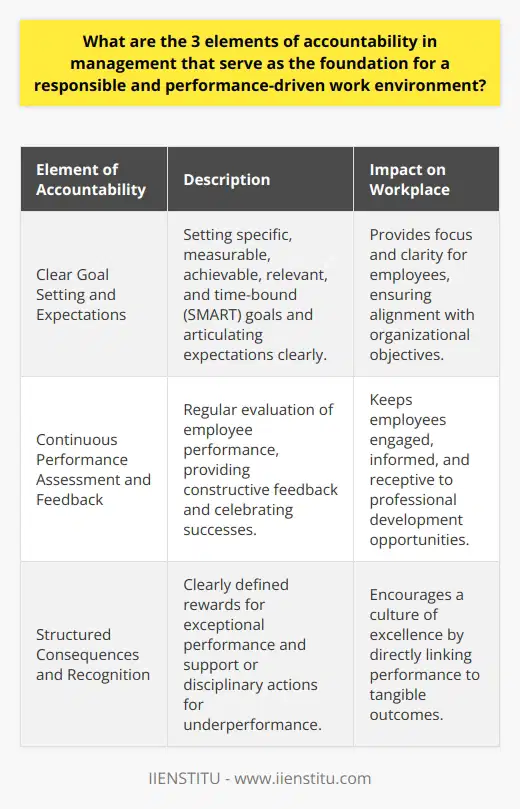
How do you create employee accountability in a way that fosters individual growth and strengthens team dynamics?
Creating Employee Accountability
Developing employee accountability necessitates strategic planning and empathetic leadership, fostering individual growth and strengthening team dynamics.
Define Clear Expectations
Start by establishing clear expectations. Employees can't be accountable if they don't know what they're responsible for. Clearly defined goals provide a firm foundation.
Set Performance Metrics
Next, set metrics to measure performance. This ensures that employees can track progress and understand where improvements are necessary. Quantifiable data eliminates ambiguity, promoting accountability.
Encourage Feedback
Encouraging feedback is also essential. Hold regular meetings to discuss achievements and areas for improvement. This not only enhances accountability but also fosters a culture of continuous learning.
Create Ownership
Promote ownership by assigning tasks that match each employee’s abilities and strengths. Employees who feel accountable for their work take greater pride in their accomplishments, resulting in quality performance.
Open Communication Channels
Maintain open communication channels. Employees who can openly express concerns and offer suggestions are more committed to their roles. Transparent communication builds trust within the team, fostering a cohesive work environment.
Reward Efforts
Lastly, reward efforts. Recognizing and rewarding good performance reinforces accountability and motivates employees to do their best. Employee appreciation boosts morale and productivity, sparking an intrinsic desire for continuous self-improvement.
In conclusion, creating employee accountability calls for a systematic approach. By combining clear expectations, performance metrics, feedback, a sense of ownership, open communication, and rewards, organizations can foster individual growth and strengthen team dynamics.
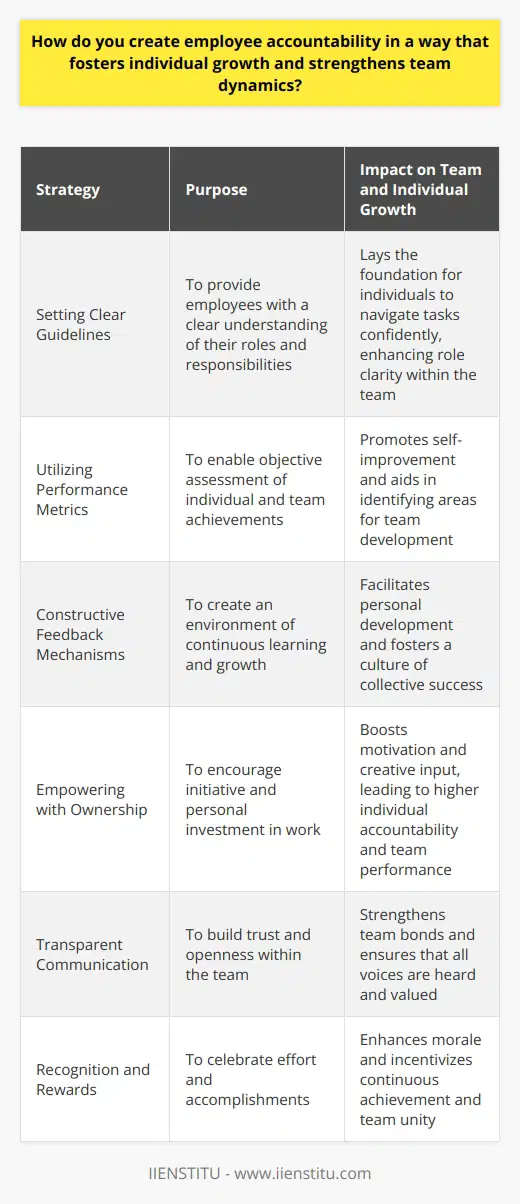
What are the practical steps to incorporate the 3 elements of accountability in management in daily operations for more effective and transparent leadership?
Creating a Culture of Answerability
To incorporate the three elements of accountability; responsibility, answerability and enforceability, into daily operations, certain practical steps become paramount. Initially, you need to clarify roles and responsibilities. This means clearly outlining the tasks, objectives and deliverables for every team member. Ensuring that everyone understands their roles and tasks helps to build a foundation of responsibility.
Promoting Transparency and Open Communication
The second step involves fostering a culture of transparent communication. Openly sharing information about team goals, performance metrics, decisions, and feedback creates an atmosphere of transparency. This builds answerability, as team members feel more involved and necessary for the team’s accomplishments.
Building Feedback Mechanisms
Thirdly, establish regular feedback systems. By constantly providing constructive feedback, you can create a feedback culture. Regular team meetings or one-on-one sessions can aid in this. Such systems can keep track of performance, helping to enforce compliance with the set roles and responsibilities.
Establish Recognition and Reward Systems
To reward accountability, recognize and reward it. By appreciating those who display a high level of accountability, it encourages others to follow suit. Establish systems where individuals or teams get recognized for fulfilling their roles.
Setting Consequences for Non-Compliance
Lastly, consequences for non-compliance enforce a culture of accountability. This does not necessarily mean punitive measures. Rather, this could involve open discussions to figure out what went wrong and create action plans for improvement.
In summary, establishing accountability in management involves creating a culture of responsibility, answerability and enforceability. Through clear communication, creating feedback systems, recognizing responsibility, and providing consequences for non-compliance, leaders can foster an accountable working environment.
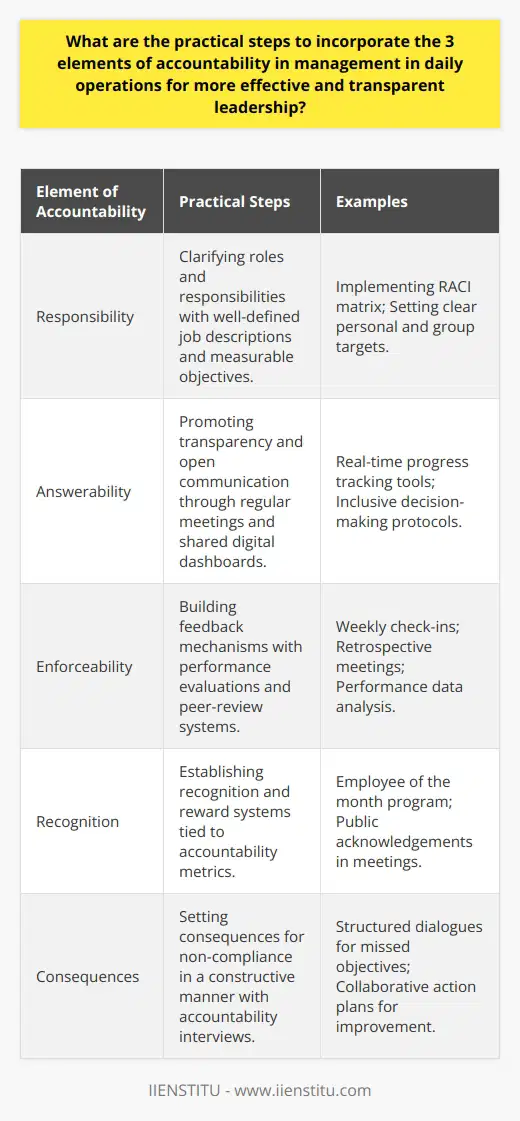
How can organizations continuously assess and improve their culture of accountability to ensure long-term success and employee satisfaction?
Regular Surveys for Employee Feedback
Organizations can enhance their culture of accountability by conducting regular surveys to gather employee feedback. These surveys provide insights into employees' perceptions of the current culture and their suggestions for improvement.
Decoding Employee Feedback
The next step involves decoding this feedback to understand the underlying issues. Leaders must analyze these responses objectively to make informed decisions. They must avoid personal biases while interpreting this feedback.
Creating Action Plans
Once organizations understand their issues, they should formulate action plans to address them. These action plans should detail specific steps for enhancing their culture of accountability.
Implementing Action Plans
The successful implementation of action plans requires the participation of everyone within the organization. Consistently communicating the plans and progress towards these goals will help ensure their successful execution.
Evaluating Outcomes
Then, following the implementation of these action plans, organizations should evaluate the outcomes. Did they effectively address the issues identified in the feedback? Evaluation helps measure progress and informs future decisions.
Continuous Cycle of Improvement
For continuous growth and success, organizations must foster a culture of continuous learning and improvement. This involves repeating the above steps periodically to stay aligned with changing circumstances and needs.
In conclusion, organizations can foster a culture of accountability by regularly seeking and decoding employee feedback, creating and implementing action plans, evaluating outcomes, and fostering a continuous cycle of improvement. This leads to better employee satisfaction and long-term organizational success.
